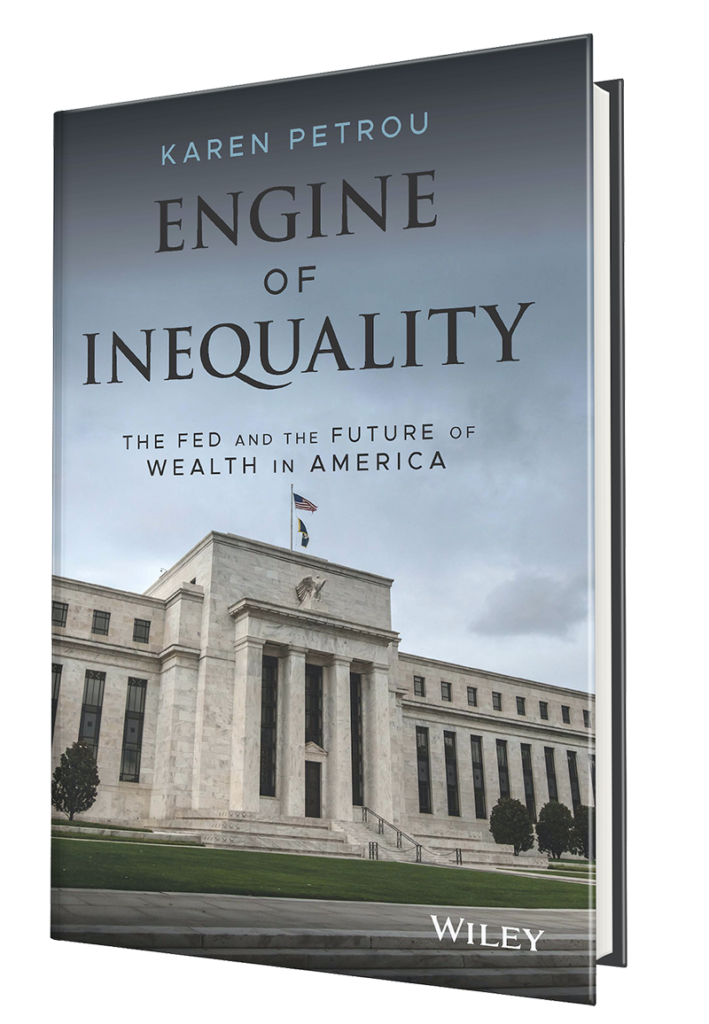Our Services
Engine of Inequality, by Karen Petrou
The first book to reveal how the Federal Reserve holds the key to making us more economically equal, written by an author with unparalleled expertise in the real world of financial policy.
Following the 2008 financial crisis, the Federal Reserve’s monetary policy placed much greater focus on stabilizing the market than on helping struggling Americans. As a result, the richest Americans got a lot richer while the middle class shrank and economic and wealth inequality skyrocketed. In Engine of Inequality, Karen Petrou offers pragmatic solutions for creating more inclusive monetary policy and equality-enhancing financial regulation as quickly and painlessly as possible.
“Petrou’s book uncovers a hidden engine of our skyrocketing inequality: financial-policy. In an accessible and engaging prose, Petrou takes us through the inner workings of monetary policy at the Fed and financial regulations, how they’ve made inequality worse and how they could instead be retooled to take us to a more equitable future. A novel look at the problem of inequality and bold ideas to help resolve it. A must read.”—Emmanuel Saez, Professor of Economics at the University of California Berkeley and author of The Triumph of Injustice
Read full description and reviews.
Industry Expert
Federal Financial Analytics (FedFin) is a Washington-based financial services-consulting firm that has for decades attracted a high-powered clientele in Washington, on Wall Street, and among global central bankers. Since 1985 FedFin has provided a unique blend of analysis and strategic advice on public policy, regulatory, and legislative issues for industry and governmental clients doing business in the U.S. and abroad.
A proprietary think-tank for its clients, FedFin reviews critical federal and global policy developments in banking, insurance, asset management, and mortgage finance, analyzes them in great depth, and then advises clients on whether what they want can be made to work for them, within the policy environment and for the financial system. It is FedFin’s guiding principle to be an honest broker, and clients depend on the fact that the firm does not offer lobbying or any other services that could compromise its objectivity and independence.
As seen In:
In the News
American Banker, Wednesday, June 4, 2025
Wells shed its asset cap — but it isn't clear why By Kyle Campbell In 2018, the Federal Reserve Board's total growth restriction on Wells Fargo established a new tool for dealing with large banks with broken compliance cultures. Many in and around the banking space viewed the $1.95 [...]
Marketwatch, Monday, June 2, 2025
Trump 'revenge tax' may open new front in global trade war, with consequences for your wallet By Chris Matthews A little-noticed provision in President Donald Trump's sweeping tax and spending bill could spark the next battle in an escalating global trade war - and potentially unnerve an already rattled market for [...]
American Banker, Monday, May 12, 2025
Examiner discretion takes center stage in CAMELS debate By Kyle Campbell As freshly appointed agency heads aim to refocus their approaches to supervision, an emerging question is how much discretion will be left for bank examiners — if any at all. Regulators and lawmakers have already sought to remove [...]
Issues in Focus
The Vault
Karen Petrou: How Banks Can Beat Stablecoins
Last week, Chair Powell mildly told the Senate Banking Committee that he favors a federal stablecoin framework without yielding to the temptation and saying what it should look like. This is doubtless because Mr. Powell is under such virulent attack in so many quarters that he wisely decided not to pick yet another fight with a President demanding speedy action. But, if pressed, I suspect Mr. Powell would agree with [...]
FedFin on: Stablecoin Regulatory Framework
After extensive controversy and debate, the Senate has passed S. 1582, a bill designed to create the federal framework for dollar-denominated stablecoins subject to U.S. law advocates believe are essential to speed innovation, improve the payment system, protect the dollar’s status, and ensure U.S. leadership in cryptoasset policy. Opponents generally do not dispute these assertions about possible stablecoin benefits, but strongly object to asymmetries between how payment-stablecoin providers would be [...]
Karen Petrou: How to Rewrite the Leverage Ratio
In 2016, FedFin issued a paper urging a radical rethink of leverage capital standards. Good things come to those who wait. Still, why we had to wait so long is hard to fathom given the predicted, manifest systemic problems due to the leverage standards evident as early as 2019 and in the two systemic crises that followed in short order. What to do? Revisiting rules he once refused to touch, [...]





